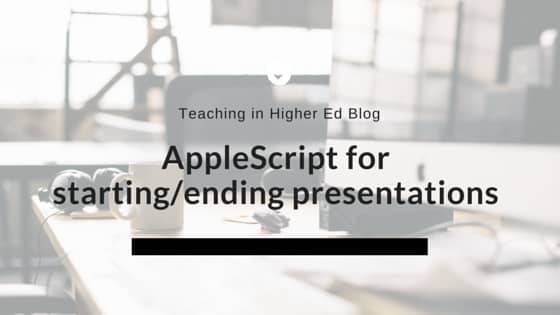
This time of year is always both exciting and terrifying for me. Maybe the fear isn’t quite as bad as terror, but I definitely experience some anxiety thinking about the start of a new academic year.
Overall, these nerves mostly seem normal and perhaps even healthy in some ways. I care about our students and want them to have a transformative experience in my classes. As I am now spending more of my time in a faculty development capacity at my institution, I consider it a sacred responsibility to also be working to help us all collectively be becoming more effective in our teaching.
Lawrence M. Lesser posted a beautifully written piece for Faculty Focus this week:
Opening Intentions for the First Day of Class
Lesser has clearly done ample reflection on the role we play as teachers in serving our students well. He was motivated by reading a poem in a Jewish prayer book that described the ways in which we might enter a place of worship. It stressed the intentions that those who gathered might emphasize. Lesser decided to write his own intentions for what he hoped those who entered his classroom experience.
He writes:
May the door of this classroom be wide enough
to receive all who seek understanding.
May the door of this classroom be narrow enough
to keep out fear or closed-mindedness.
May its threshold be no stumbling block
to those whose knowledge—or language—is shaky.
May the window of this classroom inspire us
to connect our learning to the world beyond these walls.
And may this classroom be, for all who enter,
a doorway to growth and purpose. Welcome!
That’s only a portion of his poem. I encourage you to read the entire thing. Thank you, Lawrence, for inspiring us for the new beginnings that are upon us. May this spirit of welcome be present for all of us, as we embark on our respective learning journeys.
A favorite recent musical discovery of mine comes from Brandi Carlile, as she invites a young musician (Benicio Bryant) to join her to sing her song, The Joke, on Late Night with Seth Myers. It’s a beautifully written and performed song, with Carlile showing her joy in mentoring this young talent who is accompanying her. It also reminds me of the important work we must do to welcome everyone into our classes, particularly those who may not feel like they belong there.
The lyrics are powerful, as Carlile shares two stories of individuals who are feeling marginalized and discouraged. The website Genius offers further insight into her intentions in writing the song. Carlile has shared that she wrote the first part of the song for boys feeling marginalized and forced into these kinds of awkward shapes of masculinity that they do or don’t belong in.” She also extends the invitation for healing to girls who have had the dirt kicked in their faces and been called weak.
The chorus powerfully asserts:
“Let ‘em laugh while they can
Let ‘em spin, let ‘em scatter in the wind
I have been to the movies, I’ve seen how it ends
And the joke’s on them”
Any nerves I may have about these precious first impressions within my learning environments could very well pale in comparison to how the people I meet there might be feeling. The faculty I work with may be wrestling with how to respond to last semester’s devastating course evaluations and not feeling like they are able to live up to their teaching ideals. The students I encounter may be struggling to balance all the priorities they already feel pulling on them as they enter our classroom.
May we transform any sense of fear we have into empathy for those we are so fortunate to teach this year. As we encounter those who are embattled, marginalized, and feeling like their joy has been stolen, may we listen to their stories without judgment or unrequested prescriptions.
We also must guard our hearts and minds against the toxicity that can come from engaging too frequently with those who have an antagonistic attitude toward their students. Christopher Emdin reminds all of us in his book For White Folks Who Teach in the Hood:
“The kind of teacher you will become is directly related to the kind of teachers you associate with. Teaching is a profession where misery does more than just love company—it recruits, seduces, and romances it. Avoid people who are unhappy and disgruntled about the possibilities for transforming education. They are the enemy of the spirit of the teacher.”
Let’s do this, friends.
With humility, grace, patience, love, hope, and a strong sense of purpose. Let us challenge our students and encourage them along the way. I look forward to being in community with you throughout it all.



